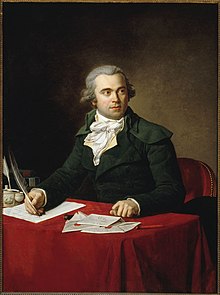Jules-François Paré: Difference between revisions
authority control moved to wikidata |
migrating Persondata to Wikidata, please help, see challenges for this article |
||
| Line 22: | Line 22: | ||
{{Authority control}} |
{{Authority control}} |
||
{{Persondata <!-- Metadata: see [[Wikipedia:Persondata]]. --> |
|||
| NAME = Pare, Jules-Francois |
|||
| ALTERNATIVE NAMES = |
|||
| SHORT DESCRIPTION = French politician |
|||
| DATE OF BIRTH = 11 August 1755 |
|||
| PLACE OF BIRTH = |
|||
| DATE OF DEATH = 29 July 1819 |
|||
| PLACE OF DEATH = |
|||
}} |
|||
{{DEFAULTSORT:Pare, Jules-Francois}} |
{{DEFAULTSORT:Pare, Jules-Francois}} |
||
[[Category:1755 births]] |
[[Category:1755 births]] |
||
Revision as of 21:34, 13 April 2016

Jules François Paré (11 August 1755, Rieux, Marne – 29 July 1819, Rieux) was a French politician.
Life
A contemporary of Georges Jacques Danton at the collège at Troyes, Paré first became a clerk during his studies in Paris and then, thanks to his employer's support, received the post of departmental commissar and then of secretary to the provisional executive council when Georges Danton was summoned to the ministry of justice. On 20 August 1793 he was made minister of the interior to replace Dominique Joseph Garat. Denounced as a "new Roland" by François-Nicolas Vincent and Jacques René Hébert and as a "danoniste" by Georges Couthon, he was dismissed on 5 April 1794, but escaped punishment, particularly the guillotine which awaited his protector. Under the French Directory, from 1796 he was commissaire to the Seine department and then administrator of military hospitals, and under the First French Empire he was made landowner of the small property in Champagne.
References
- Histoire et dictionnaire de la Révolution française 1789-1799 by Jean Tulard, Jean-François Fayard, Alfred Fierro
